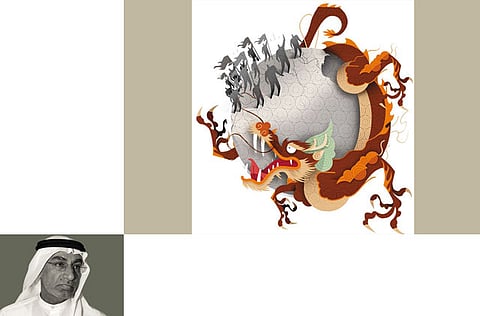Arab-China relationship has slipped to lowest level
Beijing's support for Syrian regime and its looking the other way while Iran develops nuclear capability has raised hackles

An epochal year in contemporary Arab history, 2011 might just as well go down in history as a turning point in Arab-Chinese relationship.
For the past 60 years, China has been considered a reliable friend and a solid supporter of Arab causes. The Arab-China relationship has progressed steadily and China's ties with the Arab Gulf states have gained momentum lately. There was a great deal of admiration for China as a rising future superpower and an economic role model.
But suddenly there is something unsettling in the Arab-China relationship. China is no longer viewed as positively as in the past. The image of friendly China has tumbled sharply and its reliability as a responsible superpower is in great doubt.
The turning point in the perception of China in the Arab world has to do with three key issues: the way China has reacted to the Arab Spring, which has been mostly negative, its UN Security Council veto on Syria, which came as a complete surprise, and Beijing's attitude and behaviour towards UN economic sanctions against Iran, which is causing concern among the newly empowered Arab Gulf states.
China is making many Arabs very angry these days. Little wonder that for the first time Chinese flags are burned in Arab capitals and cities, which would have been unthinkable just a year ago. It used to be the American flag that was burned by angry Arabs. Flag burning is purely symbolic but reflects the mood in the more decisive and energetic Arab street.
China should not be surprised that for the first time many bloggers have raised the usual signs of ‘shame on you China' for standing by a brutal regime in Syria. A shame on you China slogan, which is no longer limited to Syria, was triggered by Beijing's veto, which is certainly prolonging the Syrian people's agony.
In addition numerous articles in major Arab newspapers are for the first time including China in the new ‘enemies of the Arab people' list.
Friends and enemies
To call China an enemy of the Arabs is unprecedented. It is a new low for China and for its image in the Arab world. Before the Arab Spring the enemy list was exclusively preserved for the US and the political West; 2011 has changed all that. There is now a new list of ‘friends and enemies of Arabs'. The US and the EU as opposed to China are considered the new friends of the Arabs.
Another first-timer in the Arab-China relationship is the call to boycott Chinese products and calls to halt investments in China. Once again this is purely a sentimental call, which does not have any practical significance. But it is indicative of the new popular mood towards China in the Arab world. The Arab world is changing rapidly, but regrettably China is on the wrong side of change. It is viewed as a force for the status quo, not a force for change.
Most significant of all, Saudi Arabia is not happy with China these days either. King Abdullah Bin Abdul Aziz went public in his criticism of China for its shocking veto in the Security Council. For the usually low-profile Saudi Arabia and a country that is looking east to diversify its security and oil profile to go on the record in its criticism of China is a major setback for Beijing. Apparently King Abdullah was frustrated and angry with China to the point of calling China's veto "unethical". This is a strong statement coming from the king himself.
These and other first-timers are mere reactions to bad decisions and wrong moves made by China lately. From an Arab perspective China seems to be on the wrong side of history.
In a nutshell, the Arab-China relationship is going through a difficult time. The political leg of the relationship is not at its best. China's mostly negative reaction to the Arab Spring has made it less appealing.
Before 2011 the Arabs were ready to welcome China as the next superpower that would be a counter-weight to US domination in the region. Many now have second thoughts and are not sure that this China is the superpower China they had in mind.
It is not very palatable to see China hesitate to support the democratic aspirations spreading throughout the Arab world, sitting next to a brutal regime in Syria or turning the other way while Iran develops a nuclear capability. On all these issues China does not come across as a reliable and responsible future superpower.
Yet despite these wrong moves there is no evidence that China's vast interests are in any imminent danger. The economic leg of the relationship is not affected at this stage. In fact it is flourishing and will keep flourishing. However if China makes more political blunders eventually there might be a price to pay.
Soon enough there would not just be a second thought about China as a strategic partner, it might also jeopardise prospects for future investments in China.
Dr Abdulkhaleq Abdulla is a professor of political science. You can follow him on Twitter at www.twitter.com/Abdulkhaleq_UAE


